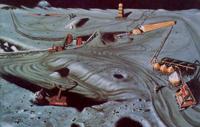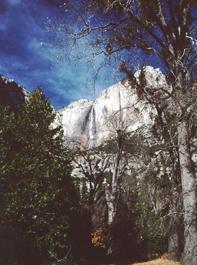May 30th, 1998
SPACE - THE FINAL FRONTIER: OR IS IT?
By Jackie Giuliano, Ph.D.
This weekend, as the world ponders the implications of the explosion of five nuclear
weapons underground in Pakistan and is gripped in the fear of a pending nuclear arms race
on the Indian subcontinent, 30,000 to 50,000 people will visit an Open House at our
nation's center for the robotic exploration of the Solar System, the Jet Propulsion
Laboratory (JPL) in Pasedena, California.
As the United States continues hypocritical admonishments of India and Pakistan while
building up its own stockpile of high-tech nuclear weapons, men, women, and children with
balloons will tour the precursors of the rocket ships that may one day leave this world.
If ever we do, will we visit other worlds with an attitude of enlightenment and wisdom? Or
will we spread our life-threatening problems of greed and self-interest throughout the
galaxy?
In addition to sharing experiential environmental learning experiences with students to
foster a sense of appreciation for our participation in the web of life, I manage a
program for the National Aeronautics and Space Administration (NASA) at JPL that trains
teachers how to teach space science and involves students with the efforts to move off of
our home planet.

A Lunar Strip Mine (from "NASA, The First 25 Years...A Resource for
Teachers," NASA publication EP-182, 1983)
Although this may seem like an incongruous match from a person who would never leave
planet Earth under any circumstances and who does everything in his power to get people to
appreciate the power and beauty of our world, there is an historical basis for my presence
there.
For many years (since the age of five), I concerned myself with the affairs of every other
planet, but in the early 1980s, I rediscovered the Earth - I came home after many years in
space. I received my undergraduate degree in astronomy and then got a job at JPL in 1977,
just after the launch of two Voyager spacecraft on their journey to Jupiter, Saturn,
Uranus, and Neptune. It was a dream come true.
However, a few years later, while standing in Yosemite National Park, surrounded by
unparalleled beauty, I realized that you could go from one end of the Solar System to the
other and not find fresh, available water or a breath of fresh air. You will not find any
sounds of birds, no cries of babies. This Earth is, and always has been, our home. I
finally left the engineering behind seven years ago to devote my life to teaching.
The program I am working with now, as an educator, not an engineer, is designing three
spacecraft. One craft, scheduled to launch in 2003, will orbit Jupiter's moon Europa.
Another spacecraft is being designed to launch in 2004 on a 12 year journey to fly by the
farthest planet in the Solar System, Pluto. The third craft, Solar Probe, will journey
closer to our own star, the Sun, than any other spacecraft has before.
It is quite a challenge to work at JPL with all my awareness of the horrors of our time.
And I have little tolerance for the monetary waste that comes with any large organization
and even less tolerance for the shortsightedness of some of the plans that are unfolding. 
Yosemite copyright 1998 by Jackie Giuliano
For example, the mission to Europa, a world that may have twice the amount of water
that the Earth has - locked up in oceans with a thick frozen surface - could be the home
of some kind of life. Current plans call for the spacecraft to eventually run out of fuel
and crash on Europa's surface. Will we discover life on another world only to pollute it
with our trash?
With the space program, we have a great opportunity to re-make our Western, patriarchal,
white, class-privileged, distorted values and revitalize our human spirit. We have the
chance to decide what footprint we want to leave behind that says - humans from Planet
Earth have been here.
Our actions in space can set a powerful example for a new way to care for our Earth, or
they can promote the same wasteful, greedy values that have damaged our planetary
life-support systems and disconnected us from the sacred natural world. Our actions in
space can contribute to clarifying or intensifying our confusion about our place in
nature.
Space will never be the final frontier - that designation must be reserved for our souls,
the home of our values. What will those values be?
How strange and wonderful is our home, our Earth,
With its swirling vaporous atmosphere,
Its flowing and frozen climbing creatures,
The croaking things with wings that hang on rocks
And soar through fog, the furry grass, the scaly seas . . .
How utterly rich and wild . . .
Yet some among us have the nerve,
The insolence, the brass, the gall to whine
About the limitations of our earthbound fate
And yearn for some more perfect world beyond the sky.
We are none of us good enough
For the world we have.
-- Edward Abbey
RESOURCES
1. Learn more about the Outer Planets/Solar Probe Project at http://www.jpl.nasa.gov/ice_fire//icefire.htm
2. Visit the other worlds in our Solar System at http://www.hawastsoc.org/solar/eng/homepage.htm
where the rich array of photos our spacecraft have taken can be seen.
3. Becoming aware of the universe above is a powerful means of connecting with the Earth
below. Watch for the Moon. See it without the aid of your computer. Then you can visit http://www.fourmilab.ch/cgi-bin/uncgi/Earth/action?opt=-m&img=Moon.evif
for an updated photographic view of our nearest neighbor.
4. Live in Southern California and want to come to the JPL Open House? Visit http://www.kfwb.com/link/jplopen.html
for directions.
5. Visit the National Space Society at http://www.nss.org/
for a view of an organization that supports space exploration.
6. Read a critique of the space program at http://www.rain.org/~openmind/nasavisn.htm
7. Learn about the issues. Seek out books on the subject. A good source for used (and new)
books is Powell’s Bookstore in Portland, Oregon at http://www.powells.com/cgi-bin/associate?assoc_id=212
where you will find a wonderful alternative to the massive chain bookstores taking over
the market.
8. Visit the owlcam at http://members.aol.com/owlbox/nest98.htm
to see a family of owls living and raising their young. Remind yourself of the miraculous
cycles of life on Earth. Updated daily.
9. The web site you are in, Envirolink, is a powerful resource. Visit it often at http://envirolink.lycos.com and look here first for
most of what you need to know about our environment.
10. Visit envirolink.org to read Jackie's weekly column "Healing Our World."
Find a complete list of past columns at http://envirolink.lycos.com/news/newsfeed/jagindex.html
Also visit Jackie's own web site at http://www.jps.net/jackieg
{Jackie Giuliano, can be found contemplating his careers after a day setting up for the
JPL open house in Venice, California. He is a Professor of Environmental Studies for
Antioch University, Los Angeles, and the University of Phoenix Southern California
Campuses as well as the Educational Outreach Manager for the Outer Planets/Solar Probe
Project. Please send your thoughts, comments, and visions to him at ecojackie@mediaone.net and visit his web site at http://www.jps.net/jackieg} |
